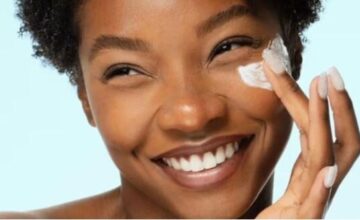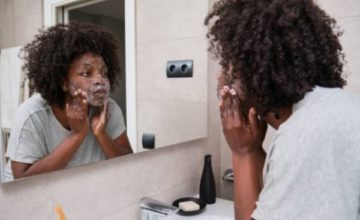
Sunscreen is one of the most important products in your skincare routine. Yet many black women fail to incorporate SPF into their beauty routine.
One of the reasons some women skip sunscreen is that they do not know how to find the right product.
Choosing the right sunscreen can be a daunting task. For starters, should you go for a chemical or mineral sunscreen?
How do you select the appropriate SPF for your needs? How do you verify the lotion’s quality is commensurate with its pricing?
Fortunately, reading sunscreen labels can help you to find the right product for you. Here is your guide to shopping for the perfect sunscreen lotion:
1. Check the SPF
The higher the SPF, the better. Right? Wrong! Higher SPF in your sunscreen does not necessarily translate into better sun protection. Dermatologists recommend SPF 30+ sunscreen formulations. That is enough SPF to provide optimum protection from harmful sun rays.
You do not need anything above SPF 50. In fact, some experts say using super-high-SPF sunscreens could lead to more UV exposure, which ups your risk for both burns and skin cancer.
You will notice that high SPF formulations tend to be thicker and leave you with a chalky appearance. Most people compensate for this chalkiness by not using the right amount of sunscreen with each application.
2. Go for broad spectrum
To provide your skin with optimum protection, you need to guard it against two types of sun rays. UVB rays damage your skin’s upper surface and are the main cause of sunburn. On the other hand, UVA rays penetrate deeper into the skin and are the primary cause of skin ageing, wrinkles, discolouration, and sagging. Both types of rays are responsible for causing skin cancer.
To protect your skin, look for labels that say “wide” or “broad” spectrum protection, which means it protects against both UVA and UVB rays. Is there one or more + signs next to your SPF grade? That is a PA+ rating, a system used in Asian countries to indicate a product’s UVA protection factor. The more plus signs, the better the protection against UVA.
3. Chemical vs mineral sunscreen
Both chemical and mineral sunscreens are effective, though in different ways. Chemical sunscreens, simply put, rely on ingredients that stimulate chemical reactions in the skin to absorb UV radiation and release them.
On the other hand, mineral sunscreens rely on inorganic substances that sit on top of the skin to deflect and scatter light. The term ‘mineral’ usually refers to the use of either zinc oxide or titanium dioxide or both, as sunscreen filters.
Most sunscreens on the market are chemical-based. However, more and more brands have added mineral sunscreen formulations in their product offering, especially as harmful ingredients such as oxybenzone and octinoxate become more restricted.
Mineral sunscreens tend to be gentler on the skin. Chemical sunscreens are more irritating than mineral or natural sunscreens. If you have sensitive skin, go for formulas that incorporate physical.
4. When to go for water-resistant sunscreen
Water-resistant (or sweat-resistant) sunscreen comes in handy for swimming and sweaty activities. Usually, a water-resistant formula can provide protection for about 40 to 80 minutes when you are swimming or sweating.
However, no formula is truly water-proof. That is why the FDA does not allow brands to use labels such as “water-proof” or “sweat-proof” on their sunscreen products. Therefore, while a water-resistant sunscreen may be a better choice for swimming, you still need to reapply sunscreen frequently.
5. Face vs body sunscreen
Does it matter if you use regular body sunscreen on your face? Well, while you can use body sunscreen on your face, it is not ideal. Facial sunscreens are made differently to avoid clogging pores and causing acne breakouts. Because zinc oxide is what gives us the pasty look that everyone seeks to avoid, they also usually have less of it. That is why many facial sunscreens contain a combination of zinc oxide and a chemical blocker.
Another advantage of facial sunscreen formulations is that they are easy to apply. They are specially designed to go with make-up and other skincare products. Body sunscreens tend to be thicker and are typically better for sections of the body where sweating is an issue.




